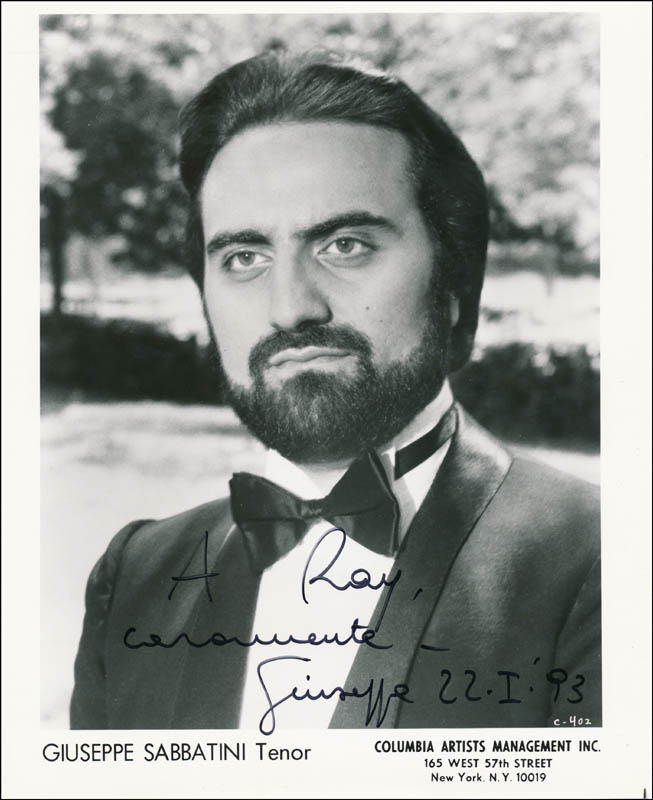Sabbatini made his first musical experiences in the boys' choir of the Sistine Chapel. His studies at the Accademia
di Santa Cecilia were dedicated not to the voice, but the double-bass, and he played that instrument for several years in Italian
orchestras like the RAI broadcasting station in Rome, or the Arena di Verona.
When his voice was discovered, he took singing lessons with Silvana Ferraro in his native Rome, and won the Tito Schipa Competition
in Lecce in 1986, as well as three more competitions in 1987, the year in which he also made his tenor debut as Edgardo in Spoleto,
followed by Werther and Rodolfo for the AsLiCo theater circuit in Lombardy. His career developed quickly: in 1988, he already
sang in Rome, Verona (Teatro Filarmonico), Bari, Trieste, at La Scala, at the Ravenna Festival, in Bergamo and Cologne; in 1989,
in Bologna, Parma, Zürich and at the Vienna Staatsoper.
He regularly returned to the major Italian opera houses, made his debut at Covent Garden in 1991, at the Teatre del Liceu in
1992, in San Francisco and Torino in 1995, in Monte Carlo, Lyon and Naples in 1997, in Chicago in 1999 and in Paris in 2000
(Théâtre Châtelet) and 2001 (Opéra Bastille), respectively; in 2001, he also arrived at the New York
Met, earning rave reviews, and in Toulouse. La Scala and the Vienna Staatsoper were probably the theaters were he sang most
often.
From the very beginning, he had always announced he would quit the stage at age 50, and be a conductor from then on. And he
actually sticked to it: in April 2008, shortly before his 51st birthday, he made the official transition from singer to conductor,
and continued his career as such for many years (on a far more provincial level than as a singer, though).
I've heard Sabbatini very often, and liked him much; he was beyond doubt one of the best singers of his generation. The modern
response to Tito Schipa, so to speak: no, he was of course not half as perfect, technically, as Schipa (he lived some 70 years
too late for that), his voice production was at times mannered, nasal, not entirely free. But his musicality was far superior to
practically all his contemporaries, and he excelled particularly in belcanto style, and in French opera. Plus he had learned one
of the most important lesson Schipa's recordings can teach: how to achieve truly dramatic effects with a less than huge, lyrical,
veiled voice. His Werther was clearly modelled on Schipa's example, and was just stunning, by far the best Werther since Schipa
and Kozlovskyj. Fantastic, as well, were his Carlo in Linda di Chamounix and his Edgardo (although the Tower Scene was a tad more
dramatic than suitable for his voice); very good his des Grieux in Manon, his Hoffmann, his Rodolfo, his Arturo; good his
Lenskij and even, surprisingly, his Arnold. What he had no knack for was Verdi: his Duca and his Alfredo were failures, his
Riccardo was acceptable, if still dry and a bit academic. Strangely, as he was normally such an excellent belcanto singer, his
Fernand in La favorite was another failure. All in all, however, Sabbatini was definitely one of the very few luminous figures
still active in opera into the 21st century.
Reference: Kutsch & Riemens
